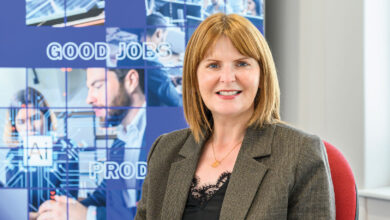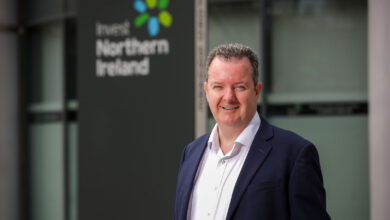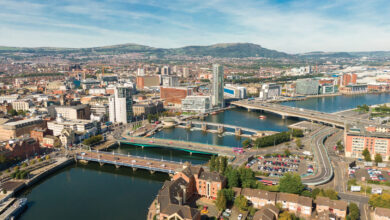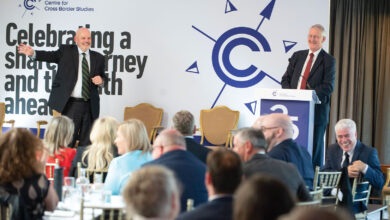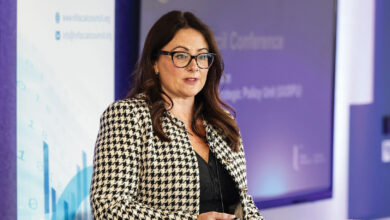Why rural matters
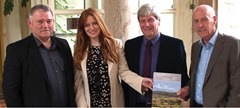 Mark Conway, Vice-Chair of Rural Housing Association, discusses the merits of Rural Housing Association’s new Rural Design Guide.
Mark Conway, Vice-Chair of Rural Housing Association, discusses the merits of Rural Housing Association’s new Rural Design Guide.
Quite often in life it’s important to state the obvious. So here goes. In Rural, we’re interested in, even consumed by, two things: (a) rural Northern Ireland and (b) social housing for people who live in rural Northern Ireland.
Within those contexts, in Rural we like to think we march to particular tunes, two of which are:
• Rural Northern Ireland enjoys a unique settlement pattern and an inter-linked community culture that has its roots in Neolithic/Gaelic/Plantation/Ulster-Scots/Famine/Industrial Revolution/farming Ulster; and
• Planning policies over the past half-century have failed to either appreciate, understand or foster that uniqueness but have instead majored on centralisation and the debilitation of rural Northern Ireland.
It may be arrogant – though as largely rural people ourselves we believe it’s a justified arrogance – but we see Rural’s mission as being to help sustain rural Northern Ireland and the people in and of it.
We try to do that by providing quality social housing in rural places for rural people in housing need. For us, our houses are not ends in themselves but are rather the means to a whole series of ends. Any and all rural housing should:
• reflect, respect and sustain the needs, wants and aspirations of rural people;
• reflect, respect and sustain local social and economic cultures and heritages and the landscapes/environments that helped shape them;
• be sustainable, in the proper tri-partite sense of socially, economically and environmentally;
• stand against the growing suburbanisation and despoiling of rural Northern Ireland through the development of inappropriate house styles, layouts, surrounds and gardens, and entrances; and
• above all “be the part and look the part”.
We’ve always struggled with one-size-fits-all approaches. For example, like many others, we could never understand why the DoE would put a huge effort into breaking rural Northern Ireland down into 130 different Landscape Character Areas but then insist on rigidly applying a single, inflexible Rural Planning Policy to that brilliant diversity.
Nor could we understand planning orthodoxies such as the one which, in our view, is hugely dangerous by insisting that new farm houses should be sited as close as possible to clusters of farm buildings. This is regardless of the sad fact that farm buildings and farmyards are now amongst the most potentially lethal settings we have in Northern Ireland.
In the same way, whilst we are firm believers in space, technical and safety standards we think we would serve our people better if we could maybe move a wee bit away from the standard house type notion. There’s nothing standard about our people or their circumstances or their settings. Why shouldn’t we have some flexibility to reflect that variety in the houses they are to live in?
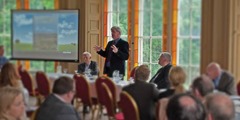 Finally, as true volunteers with no axes to grind we believe we have both the luxury and the obligation of contributing freely to housing and planning debates. That’s where our Design Guide notion came from.
Finally, as true volunteers with no axes to grind we believe we have both the luxury and the obligation of contributing freely to housing and planning debates. That’s where our Design Guide notion came from.
In developing it we were blessed to have commissioned GM Design Associates to do the work with us. We were particularly blessed to have GM’s Johnny Stewart as our inspiration throughout the task. It is just so good to work with organisations and people who believe in what they do.
Informed answers
Our guide is not meant to be prescriptive. The brilliant diversity of rural NI is not the result of prescription but is instead the result of generations of people coming up with informed answers to issues they faced.
In that same spirit, it’s not for us to “tell” anyone what to do. Four of our guide’s six chapters thus deliberately include the word “considering” in their title. In a nutshell, that’s what we hope will be our guide’s contribution that it might prompt people to consider things that might otherwise have slipped by them.
Because we see people’s houses as central to all aspects of their lives – social, economic, community and environmental – our guide looks at the ‘breadth and depth’ of rural houses, at how they can work, look and impact on people and places to best effect. It considers locations, sites, layouts and the buildings themselves. But if there’s a consistent theme throughout the guide, then it’s the concern with how houses and their settings ‘work’. If something works, it tends to look good, simply because it invariably is good.
For decades, rural Northern Ireland has had a surfeit of ‘experts’ telling us: “That might work in practice but it doesn’t work in theory … so you can’t or shouldn’t have it.” Our guide is about turning that perverse dynamic on its head. The things we’d hope people might now think about include:
• how do we re-create the setting and dynamic of the farm ‘street’ (as opposed to the very different and dangerous farmyard)?
• how can we make use of brilliant natural shelter assets such as the whin bush?
• how can we design in a capacity for the economic pluri-activity that government (rightly) tells us we must strive for?
• how do we remove design snobbery regarding objects such as satellite dishes and see them instead as the powerful social and economic resources they are?
• how do we persuade people to see solar panels as the modern incarnation of the traditional chimney?
When we first set out with Rural nearly a quarter of a century ago, we were vain enough to hope we would contribute to making rural Northern Ireland more vibrant, more wholesome and more sustainable. Our Design Guide is intended to put another shoulder to that wheel.
In my parallel GAA world, we relentlessly latch onto the greatest words ever uttered by Ted Kennedy, used to close the greatest speech he ever made: “The work goes on. The cause endures. The hope still lives. And the dream shall never die.” Our Design Guide is central to our work, our cause, our hope and our dream. Put simply, that’s why we produced it. And it’s why we hope people will take a look at it.
Opportunites
Rural Housing Association is actively seeking new opportunities to provide social, affordable homes in rural areas. We are keen to hear from anyone who knows of a potential development site or existing properties that could help us meet rural housing need.
We’re asking site owners, developers and the owners of property portfolios to get in touch. We are also asking local political representatives to work with us to help identify potential sites which we can develop to provide social housing in rural Northern Ireland. If you have a potential development opportunity, please contact Paul Fox on 028 8224 6118 or email pfox@ruralhousing.co.uk
 Copies of the Rural Design Guide are available free from Rural Housing Association.
Copies of the Rural Design Guide are available free from Rural Housing Association.
Tel: 028 822 46118
Email: info@ruralhousing.co.uk
Web: www.ruralhousing.co.uk/publications

